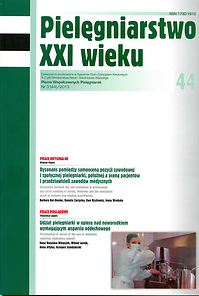Opinions of professionally active nurses on the impact of educational level on their quality of life
Keywords:
education, the quality of life, professional workAbstract
OPINIONS OF PROFESSIONALLY ACTIVE NURSES ON THE IMPACT OF EDUCATIONAL LEVEL ON THEIR QUALITY OF LIFE
Introduction. Nurses perform a difficult job that requires engagement, often at the cost of family and friends. They are exposed to stress and occupational burnout, because they work in troublesome conditions while taking care of bed-ridden patients. In Poland, this occupation is not seen as prestigious.
Aim. The presentation shows to which extent the quality of nurses’ life is conditioned by their level of education.
Material and methods. The research comprised 100 nurses. All of them worked in NZOZ New Hospital in Szubin and Nakło from March to May 2011. The research method applied was a diagnostics survey. The technique used was the questionnaire with the use of the author’s own survey. The participation in the research was voluntary.
Results. The respondents had secondary nursing education (68%), had a Bachelor’s Degree (28%) and Master’s Degree (4%). Additionally, 54% – a specialist course, 9% – a qualifying course and 6% completed nurse specialization. The nurses’ income was too low in relation to their needs (44%). That is why they were rarely involved in the sphere of cultural activities (69%). The reason for the nurses being physically inactive (70%) was the lack of time resulting from the numerous duties (both at home and at work).
Conclusions. The level of education does not determine significantly the quality of nurses’ life. Even though, nurses are satisfied with their housing conditions and some material goods. The quality of a nurses’ life is more conditioned by the lack of time than by their health condition. In the aspect of life quality, nurses do not stand out as a profession in the background of the country’s population.
References
1. Bańka A. Psychologia jakości życia. Poznań: Wyd. Stowarzyszenie Psychologia i Architektura; 2005.
2. Bańka A, Derbis R. Psychologiczne i pedagogiczne wymiary jakości życia. Poznań – Częstochowa: Wyd. Gemini; 1994.
3. Bańka A, Derbis R. Pomiar i poczucie jakości życia u aktywnych zawodowo oraz bezrobotnych. Poznań – Lublin: Wyd. Środkowoeuropejskie Centrum Ekonomii Działania Społecznego; 1995.
4. Kucharz M. Badanie poziomu satysfakcji pielęgniarek z pracy zawodowej. Kraków: Akademia Ekonomiczna w Krakowie; 2005.
5. Wysokiński M, Fidecki W, Walas L. Satysfakcja z życia polskich pielęgniarek. Problemy Piel. 2009; 17 (3): 167-172.
6. Książek J, Szewczyk G. Satysfakcja zawodowa pielęgniarek a bezpieczeństwo chorych. Poznań: Wyd. Wyższej Szkoły Bezpieczeństwa; 2010.
7. www.e-godpodarka.pl
Downloads
Published
Issue
Section
License
Copyright (c) 2013 Mariola Głowacka, Izabela Gorzycka, Beata Haor (Autor)

This work is licensed under a Creative Commons Attribution 4.0 International License.




